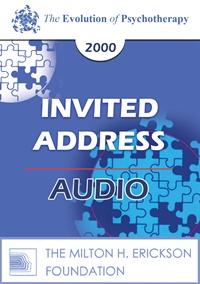
- Average Rating:
- Not yet rated
- Topic Areas:
- Invited Addresses | Psychotherapy | History of Psychotherapy | Psychoanalysis
- Categories:
- Evolution of Psychotherapy | Evolution of Psychotherapy 2000
- Faculty:
- Judd Marmor | James Bugental, PhD
- Duration:
- 1 Hour 28 Minutes
- Format:
- Audio Only
- Original Program Date:
- May 29, 2000
- Short Description:
- This address is a review of the significant theoretical and practical changes in the practice of psychoanalytically-oriented psychotherapy in the experience of the author's personal practice over the past 62 years.
- Price:
- $15.00 - Base Price
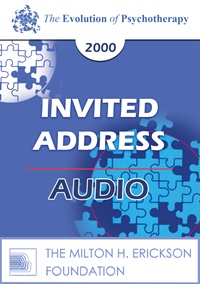
- Average Rating:
- Not yet rated
- Topic Areas:
- Psychotherapy | Invited Addresses | Narcissism | Personality Disorders | Psychoanalysis | Object Relations Theory
- Categories:
- Evolution of Psychotherapy | Evolution of Psychotherapy 2000
- Faculty:
- James F. Masterson, MD | James Hillman, PhD
- Duration:
- 1 Hour 19 Minutes
- Format:
- Audio Only
- Original Program Date:
- May 29, 2000
- Short Description:
- In this paper, Dr. Masterson gives an understanding of the intrapsychic structure of Narcissistic Personality Disorder and how it finds clinical expression through the disorders of the self triad. Clinical cases are presented to illustrate how the therapeutic intervention of mirroring interpretation of narcissistic vulnerability helps the patient to convert transference acting-out to therapeutic alliance and transference, thereby creating the condition for psychoanalytic psychotherapy.
- Price:
- $15.00 - Base Price
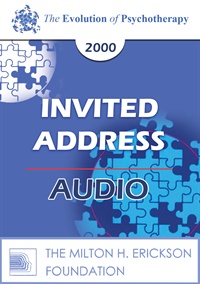
- Average Rating:
- Not yet rated
- Topic Areas:
- Invited Addresses | Psychotherapy | Systems Theory
- Categories:
- Evolution of Psychotherapy | Evolution of Psychotherapy 2000 | Pioneers in Couples and Family Therapy
- Faculty:
- Paul Watzlawick, PhD | Zerka Moreno
- Duration:
- 1 Hour 26 Minutes
- Format:
- Audio Only
- Original Program Date:
- May 29, 2000
- Short Description:
- Watzlawick explores the “therapy of as if,” showing how behaving as if change is possible can shift a client’s reality. Drawing from philosophy, hypnotherapy, and paradox, he illustrates how small interventions—like self-fulfilling prophecies or shared metaphors—can break unhelpful cycles. Zerka Moreno adds insights from action-based methods, including role reversal and sociodrama, to deepen perspective and foster movement.
- Price:
- $15.00 - Base Price
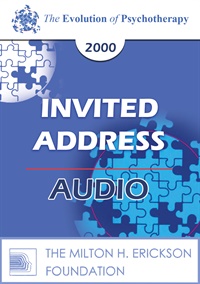
- Average Rating:
- Not yet rated
- Topic Areas:
- Invited Addresses | Existential Therapy | Psychotherapy
- Categories:
- Evolution of Psychotherapy | Evolution of Psychotherapy 2000 | Pioneers in Couples and Family Therapy
- Faculty:
- Irvin Yalom, PhD | Cloe Madanes, HDL, LIC
- Duration:
- 1 Hour 28 Minutes
- Format:
- Audio Only
- Original Program Date:
- May 29, 2000
- Short Description:
- Dr. Yalom will discuss the definition of existential psychotherapy, its sources, basic tenets and applications in clinical work. Major focus will be on the ultimate concerns of death, meaninglessness, freedom and isolation. Dr. Yalom will discuss his approach to teaching about this field through a literary conveyance.
- Price:
- $15.00 - Base Price
Tags: Existential Psychotherapy
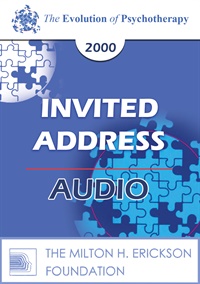
- Average Rating:
- Not yet rated
- Topic Areas:
- Invited Addresses | Therapist Development | Psychotherapy
- Categories:
- Evolution of Psychotherapy | Evolution of Psychotherapy 2000
- Faculty:
- Jeffrey Zeig, PhD | Erving Polster, PhD
- Duration:
- 1 Hour 27 Minutes
- Format:
- Audio Only
- Original Program Date:
- May 29, 2000
- Short Description:
- Therapy promotes "movement." To facilitate movement the therapist can assume therapeutic "postures." These postures are a font from which interventions follow.
- Price:
- $15.00 - Base Price
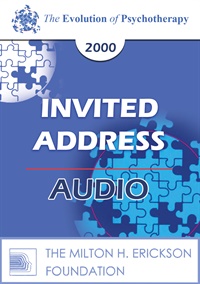
- Average Rating:
- Not yet rated
- Topic Areas:
- Invited Addresses | History of Psychotherapy | Therapy Practice
- Categories:
- Evolution of Psychotherapy | Evolution of Psychotherapy 2000 | Pioneers in Couples and Family Therapy
- Faculty:
- Jay Haley, MA | Otto Kernberg, MD
- Duration:
- 1 Hour 16 Minutes
- Format:
- Audio Only
- Original Program Date:
- May 29, 2000
- Short Description:
- This address traces key shifts in psychotherapy, from the rise of family and brief therapy to evolving views on the unconscious and client privacy. It addresses the tension between therapy as science versus art and considers its role in settings like corrections and foster care. The importance of ethical standards and clearly defining psychotherapy is emphasized. Afterwards there is a discussion, including Otto Kernberg offering commentary on what he calls Haley's oversimplification of therapy history.
- Price:
- $15.00 - Base Price

- Average Rating:
- Not yet rated
- Topic Areas:
- Conversation Hours | Psychotherapy
- Categories:
- Evolution of Psychotherapy | Evolution of Psychotherapy 2000
- Faculty:
- Michael White, B.A.S.W.
- Duration:
- 58 Minutes
- Format:
- Audio Only
- Original Program Date:
- May 28, 2000
- Short Description:
- EP00 Conversation Hour 16 - Michael White, BASW
- Price:
- $15.00 - Base Price
Tags: Psychotherapy
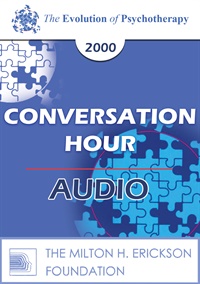
- Average Rating:
- Not yet rated
- Topic Areas:
- Conversation Hours | Family Therapy | Cultural and Social Contexts
- Categories:
- Evolution of Psychotherapy | Evolution of Psychotherapy 2000 | Pioneers in Couples and Family Therapy
- Faculty:
- Salvador Minuchin, MD
- Duration:
- 1 Hour 3 Minutes
- Format:
- Audio Only
- Original Program Date:
- May 28, 2000
- Short Description:
- Minuchin reflects on his evolution as a family therapist, shaped by his cultural roots and experiences with close-knit systems. He challenges therapists to move beyond individual focus and address the broader social and economic forces that shape family dynamics. Offering both critique and inspiration, he advocates for collaborative, targeted interventions that honor complexity, especially within evolving family structures and institutional constraints.
- Price:
- $15.00 - Base Price

- Average Rating:
- Not yet rated
- Topic Areas:
- Conversation Hours | Psychotherapy
- Categories:
- Evolution of Psychotherapy | Evolution of Psychotherapy 2000
- Faculty:
- Miriam Polster
- Duration:
- 58:56
- Format:
- Audio Only
- Original Program Date:
- May 28, 2000
- Short Description:
- EP00 Conversation Hour 13 - Miriam Polster, PhD
- Price:
- $15.00 - Base Price
Tags: Miriam Polster Psychotherapy
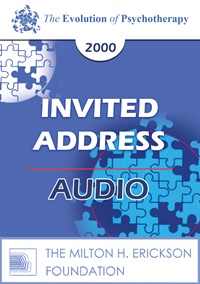
- Average Rating:
- Not yet rated
- Topic Areas:
- Invited Addresses | Meditation, Spirituality and Yoga | Psychotherapy
- Categories:
- Evolution of Psychotherapy | Evolution of Psychotherapy 2000
- Faculty:
- James Hillman, PhD | Donald Meichenbaum, PhD
- Duration:
- 1 Hour 28 Minutes
- Format:
- Audio Only
- Original Program Date:
- May 28, 2000
- Short Description:
- Besides the patient's past history and present intrapsychic complaints, besides his/her interpersonal relations, the patient lives in an aesthetic, spiritual, cultural, economic and environmental world of intimate things, physical places and invisible atmospheres. To focus mainly upon personal subjectivity to the neglect of the non-human factors falsifies the patient's daily actuality and endangers therapy with artificiality. Therapy must therefore bridge into the world.
- Price:
- $15.00 - Base Price

- Average Rating:
- Not yet rated
- Topic Areas:
- Ericksonian Psychotherapy | Psychotherapy | Invited Addresses | Neurobiology | Neuroscience
- Categories:
- Evolution of Psychotherapy | Evolution of Psychotherapy 2000
- Faculty:
- Ernest Rossi, PhD | Thomas Szasz, MD
- Duration:
- 1 Hour 25 Minutes
- Format:
- Audio Only
- Original Program Date:
- May 28, 2000
- Short Description:
- Current research on neurogenesis (growth of new brain cells) indicates that novelty, environmental enrichment and physical exercise can facilitate new growth in the adult human brain. How can we optimize our Ericksonian approaches to support the psychobiological growth process?
- Price:
- $15.00 - Base Price
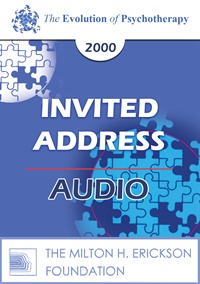
- Average Rating:
- Not yet rated
- Topic Areas:
- Invited Addresses | Bioenergetics | Mind-Body | Psychotherapy
- Categories:
- Evolution of Psychotherapy | Evolution of Psychotherapy 2000
- Faculty:
- Alexander Lowen, MD | Eugene Gendlin, PhD
- Duration:
- 1 Hour 19 Minutes
- Format:
- Audio Only
- Original Program Date:
- May 28, 2000
- Short Description:
- Since the person is his body, it is possible to read the history of the individual from the pattern of chronic muscular tension in his body. These chronic tensions limit the individual's ability to respond in a healthy way to the stresses of life. Bioenergetics provides a technique for reducing these tensions.
- Price:
- $15.00 - Base Price
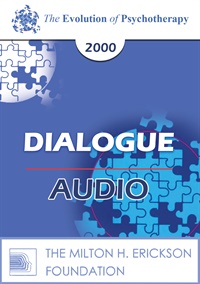
- Average Rating:
- Not yet rated
- Topic Areas:
- Psychotherapy | Dialogues | Storytelling
- Categories:
- Evolution of Psychotherapy | Evolution of Psychotherapy 2000
- Faculty:
- Donald Meichenbaum, PhD | Michael White, B.A.S.W.
- Duration:
- 56 Minutes
- Format:
- Audio Only
- Original Program Date:
- May 28, 2000
- Short Description:
- EP00 Dialogue 07 - Nature and Challenge of a Narrative Perspective of Psychotherapy - Donald Meichenbaum, Ph.D., and Michael White, B.A.S.W. Given a topic, to become aware of the differing approaches to psychotherapy, and to identify the strengths and weaknesses in each approach. Moderated by Ellyn Bader, Ph.D.
- Price:
- $15.00 - Base Price
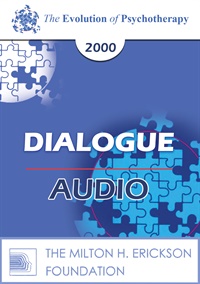
- Average Rating:
- Not yet rated
- Topic Areas:
- Dialogues | Brief Therapy | Intervention Strategies
- Categories:
- Evolution of Psychotherapy | Evolution of Psychotherapy 2000 | Pioneers in Couples and Family Therapy
- Faculty:
- William Glasser, MD | Paul Watzlawick, PhD
- Duration:
- 56 Minutes
- Format:
- Audio Only
- Original Program Date:
- May 28, 2000
- Short Description:
- Glasser and Watzlawick explore how small shifts in attitude and approach can lead to big changes in therapy. Glasser draws from his work in schools and hospitals, showing how empathy and avoiding control help build trust. Watzlawick adds stories of paradox and surprise, reminding us that change often comes when we least expect it...and that the therapist's stance can make all the difference. Moderated by Camillo Loriedo
- Price:
- $15.00 - Base Price
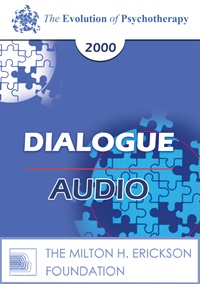
- Average Rating:
- Not yet rated
- Topic Areas:
- Psychotherapy | Dialogues | Group Psychotherapy
- Categories:
- Evolution of Psychotherapy | Evolution of Psychotherapy 2000
- Faculty:
- Miriam Polster | Irvin Yalom, PhD
- Duration:
- 58 Minutes
- Format:
- Audio Only
- Original Program Date:
- May 28, 2000
- Short Description:
- EP00 Dialogue 09 - Group Psychotherapy - Miriam Polster, Ph.D., and Irvin Yalom, M.D. Given a topic, to become aware of the differing approaches to psychotherapy, and to identify the strengths and weaknesses in each approach. Featuring Miriam Polster, Ph.D., and Irvin Yalom, M.D., moderated by W. Michael Munion, M.A.
- Price:
- $15.00 - Base Price
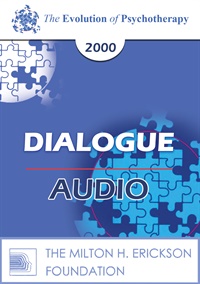
- Average Rating:
- Not yet rated
- Topic Areas:
- Psychotherapy | Dialogues
- Categories:
- Evolution of Psychotherapy | Evolution of Psychotherapy 2000
- Faculty:
- James Hillman, PhD | Thomas Szasz, MD
- Duration:
- 57 Minutes
- Format:
- Audio Only
- Original Program Date:
- May 28, 2000
- Short Description:
- EP00 Dialogue 10 - Critique of Therapy - James Hillman, Ph.D., and Thomas Szasz, M.D. Given a topic, to become aware of the differing approaches to psychotherapy, and to identify the strengths and weaknesses in each approach. Moderated by Bernhard Trenkle, Dipl. Pysch.
- Price:
- $15.00 - Base Price
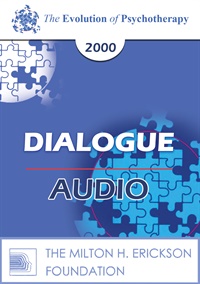
- Average Rating:
- Not yet rated
- Topic Areas:
- Psychotherapy | Dialogues | Brief Therapy
- Categories:
- Evolution of Psychotherapy | Evolution of Psychotherapy 2000
- Faculty:
- Mary Goulding, MSW | Arnold Lazarus, Ph.D.
- Duration:
- 56 Minutes
- Format:
- Audio Only
- Original Program Date:
- May 28, 2000
- Short Description:
- EP00 Dialogue 11 - Making Therapy Brief - Mary Goulding, M.S.W., and Arnold Lazarus, Ph.D. Given a topic, to become aware of the differing approaches to psychotherapy, and to identify the strengths and weaknesses in each approach. Featuring Mary Goulding, M.S.W., and Arnold Lazarus, Ph.D., moderated by Brent Geary, Ph.D.
- Price:
- $15.00 - Base Price
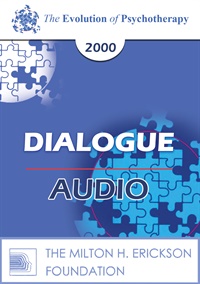
- Average Rating:
- Not yet rated
- Topic Areas:
- Psychotherapy | Dialogues | Neuroscience
- Categories:
- Evolution of Psychotherapy | Evolution of Psychotherapy 2000
- Faculty:
- Judd Marmor | Ernest Rossi, PhD
- Duration:
- 59 Minutes
- Format:
- Audio Only
- Original Program Date:
- May 28, 2000
- Short Description:
- EP00 Dialogue 12 - Facilitating Neurogenesis in Psychotherapy - Judd Marmor, M.D., and Ernest Rossi, Ph.D. Given a topic, to become aware of the differing approaches to psychotherapy, and to identify the strengths and weaknesses in each approach.
- Price:
- $15.00 - Base Price
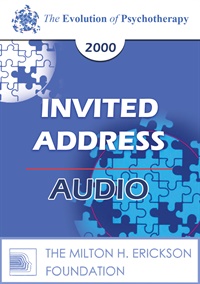
- Average Rating:
- Not yet rated
- Topic Areas:
- Invited Addresses | Focusing | Mind-Body | Psychotherapy
- Categories:
- Evolution of Psychotherapy | Evolution of Psychotherapy 2000
- Faculty:
- Eugene Gendlin, PhD | Jeffrey Zeig, PhD
- Duration:
- 1 Hour 26 Minutes
- Format:
- Audio Only
- Original Program Date:
- May 28, 2000
- Short Description:
- The edge where almost all therapy and thought get stuck is a physical bodily place hardly anyone knows to go into.
- Price:
- $15.00 - Base Price
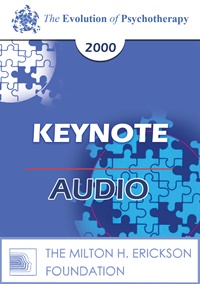
- Average Rating:
- Not yet rated
- Topic Areas:
- Keynotes | Social Psychology | Research | Communication | Motivation
- Categories:
- Evolution of Psychotherapy | Evolution of Psychotherapy 2000
- Faculty:
- Elliot Aronson, Ph.D.
- Duration:
- 1 Hour 3 Minutes
- Format:
- Audio Only
- Original Program Date:
- May 28, 2000
- Short Description:
- This talk brings social psychology to life through vivid, often surprising stories about how people talk themselves into change. Rather than relying on advice or persuasion, it shows how situations that evoke integrity, empathy, and personal responsibility can lead to lasting shifts in behavior. Therapists and students will find fresh ways to think about motivation, resistance, and change, with ideas that naturally echo many therapeutic moments in the consulting room.
- Price:
- $15.00 - Base Price
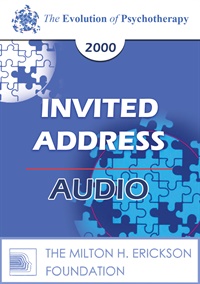
- Average Rating:
- Not yet rated
- Topic Areas:
- Invited Addresses | Reality Therapy | Psychotherapy
- Categories:
- Evolution of Psychotherapy | Evolution of Psychotherapy 2000
- Faculty:
- William Glasser, MD | Irvin Yalom, PhD
- Duration:
- 1 Hour 28 Minutes
- Format:
- Audio Only
- Original Program Date:
- May 28, 2000
- Short Description:
- After 35 years of experience, Dr. Glasser has now updated his original Reality Therapy. It now is based on his new theory of how people function, called Choice Theory. Because this theory eliminates what Dr. Glasser believes is a hindrance to therapy, talking about the past or focusing on the symptom, it is effective from the first session and can be completed in ten sessions or less with most clients.
- Price:
- $15.00 - Base Price
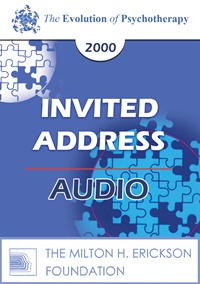
- Average Rating:
- Not yet rated
- Topic Areas:
- Invited Addresses | Psychotherapy
- Categories:
- Evolution of Psychotherapy | Evolution of Psychotherapy 2000
- Faculty:
- Albert Ellis, PhD | William Glasser, MD
- Duration:
- 1 Hour 23 Minutes
- Format:
- Audio Only
- Original Program Date:
- May 28, 2000
- Short Description:
- This address shows how clients can learn to get better rather than just feel better. They can learn to make a profound philisophical change, maintain it, and make themselves remarkably less disturbable even in the face of serious adversities.
- Price:
- $15.00 - Base Price
Tags: Albert Ellis Psychotherapy
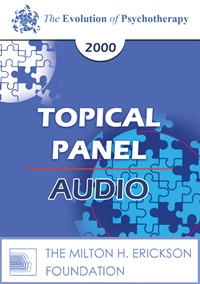
- Average Rating:
- Not yet rated
- Topic Areas:
- Topical Panels | Homework | Therapist Development | Strategic Therapy
- Categories:
- Evolution of Psychotherapy | Evolution of Psychotherapy 2000 | Pioneers in Couples and Family Therapy
- Faculty:
- Alexander Lowen, MD | Miriam Polster | Paul Watzlawick, PhD | Jeffrey Zeig, PhD
- Duration:
- 55 Minutes
- Format:
- Audio Only
- Original Program Date:
- May 28, 2000
- Short Description:
- This panel looks at how creative homework assignments can extend therapy beyond the session. From movement and breathwork to exposure tasks and playful challenges, the therapists share ways to help clients try out new behaviors and shift stuck patterns. Whether it’s making a difficult phone call or practicing being rejected, the goal is to foster agency, insight, and change in everyday life. Moderated by Bernhard Trenkle, Dipl. Psych.
- Price:
- $15.00 - Base Price
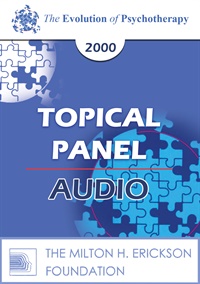
- Average Rating:
- Not yet rated
- Topic Areas:
- Topical Panels | Schizophrenia | Personality Disorders | Psychotherapy
- Categories:
- Evolution of Psychotherapy | Evolution of Psychotherapy 2000 | Pioneers in Couples and Family Therapy
- Faculty:
- Ray Corsini, PhD | Jay Haley, MA | Otto Kernberg, MD | Michael White, B.A.S.W.
- Duration:
- 53 Minutes
- Format:
- Audio Only
- Original Program Date:
- May 28, 2000
- Short Description:
- The panel presents approaches to treating schizophrenia with an emphasis on personalized care, collaboration with medication, and the use of psychotherapy. Techniques are discussed like revoicing auditory hallucinations aim to reduce vulnerability to psychotic episodes. Recovery data and the importance of psychosocial support and family involvement are also highlighted. Moderated by Ruth McClendon, MSW.
- Price:
- $15.00 - Base Price
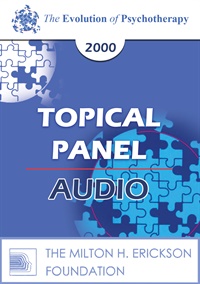
- Average Rating:
- Not yet rated
- Topic Areas:
- Topical Panels | Milton Erickson | Ericksonian Hypnosis and Therapy Techniques | Ericksonian Psychotherapy
- Categories:
- Evolution of Psychotherapy | Evolution of Psychotherapy 2000 | Pioneers in Couples and Family Therapy
- Faculty:
- Jay Haley, MA | Ernest Rossi, PhD | Paul Watzlawick, PhD | Jeffrey Zeig, PhD
- Duration:
- 54 Minutes
- Format:
- Audio Only
- Original Program Date:
- May 28, 2000
- Short Description:
- Milton H. Erickson’s innovative psychotherapy methods take center stage, including his directive style, interactive techniques, and deep attunement to patients’ language and experience. Panelists discuss his use of humor, detailed session planning, and belief in the patient’s capacity for self-directed change, emphasizing the lasting impact of his personalized approach. Moderated by Camillo Loriedo, MD.
- Price:
- $15.00 - Base Price

